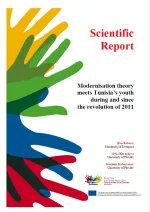Modernisation theory meets Tunisia’s youth during and since the revolution of 2011

SAHWA Scientific Paper nº. 3
This paper presents evidence from interviews in 2015-16 with a nationally representative sample of Tunisia’s 15-29 year olds. We use modernisation theory as a prism to examine the sample’s political participation and orientations during the ‘revolution’ of 2011 and subsequently. We find that just 6.6 percent of those aged 15-24 at the time played any direct part in the ‘events of 2011’. Political engagement then and subsequently is shown to have been influenced most strongly by a university education and growing-up in a politically engaged family. In 2015-16 the young people were overwhelmingly pro-democracy, supported equal opportunities and status for the sexes, and endorsed self-expression values, but attached equal importance to economic security and betterment, felt that their country’s traditions should be maintained and respected, and were personally religious though three-quarters wanted religion to be kept out of politics and government. We explain why Tunisia was the sole Arab Spring country to emerge with a still functioning (in 2016) multi-party democracy. This is despite the main parties having narrow and shallow support among the country’s youth, most of whom do not trust their elected politicians. Our survey findings suggest explanations for the paradox between young Tunisians’ overwhelming support for democracy alongside intense disappointment with the outcomes. These explanations include young Tunisians seeking a type of modernisation that does not map neatly onto Western versions of modernity, and which at present may not be realisable.
DOI: doi.org/10.24241/swsp.2017.3.1
E-ISSN: 2564-9183